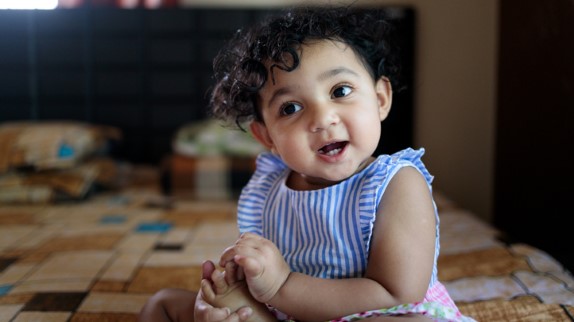Your toddler’s gift of gab isn’t delivered overnight, and some children take to language faster than others. Speech development is typically like a jabbering journey that, during your baby's first year of life, starts with cooing and crying, then progresses to babbling, and may include a few words by her first birthday.
But as your child enters toddlerhood, her vocabulary will really start to blossom. It’s a special thrill to hear her enunciate and combine new words to express her wants and needs. Watch — and listen — for these exciting toddler language developments between ages 1 and 3.
12-month speech milestones
Most babies say their first word around 12 months, although it takes some a little longer. Just like adults, some babies are simply less talkative than others! Around the 1-year-mark, your newly-crowned toddler will likely be able to:
- Imitate speech sounds
- Say a few words, such as "mama," "dada," "uh-oh" or "no"
- Use gestures like shaking her head no or waving bye-bye
- Respond to her name as well as simple words or commands like "no" or "come here"
18-month speech milestones
Chances are, your tot has been adding one to two words a week to her growing vocabulary for at least a few months now. By the time she’s 18 months, she’ll likely be able to:
- Say several single words
- Follow simple directions, like "pick up the ball"
- Point to something she wants
- Say "no"
- Recognize names for familiar people, things or body parts and point to them in person or in pictures
- Make animal noises and other sound effects
2-year speech milestones
Your toddler is learning words at a rapid pace by now. By her second birthday, she’ll likely be able to:
Read This Next
- Say around 50 words
- Follow simple instructions
- Add more words to her vocabulary every month
- Repeat words that she hears in conversations
- Say two- to four-word sentences
- Start to sing
3-year old speech milestones
Your child will make another huge leap in her language and communication skills by this age. As she nears her third birthday, your toddler will be able to:
- Say around 200 to 300 words (and sometimes even more)
- Know a word for almost everything she wants to say or identify, and ask for or indicate objects verbally
- Hold a conversation with two to three sentences
- Know her first name and age, as well as the names of friends and familiar objects
- Start asking “why” questions
- Speak clearly enough for family members (and others close to her) to understand her most of the time, though some sounds are still unclear
- Understand opposites as well as the meaning of "in," "on" and "under"
- Use words like "I" and "me"
- Follow directions that have two or three steps, such as "Pick up the teddy bear and put it in the basket"
Why is my toddler stuttering?
Up to 10 percent of toddlers up from ages 2 to 6 repeat sounds, syllables or words when they talk. This "disfluency" or developmental stuttering in toddler speech is normal and may last for a few days or months, or occur sporadically. It happens because your child has a lot she wants to say but hasn’t yet acquired a large enough vocabulary to fully express herself. Pretty frustrating, huh?
To help your child feel fluent instead of frazzled, do your best to understand what she’s trying to say. Devote your full attention to her, and don’t interrupt. When you’re speaking to her, stay relaxed and go slowly.
If these strategies don’t work and your child seems physically tense when she speaks, or avoids talking because she’s uncomfortable, ask your child’s pediatrician if she could benefit from speech therapy. Look for a speech pathologist who has a certificate of clinical competence, or CCC, from the American Speech-Language-Hearing Association (ASHA).
When to talk to your doctor about your toddler's language development
If your child doesn’t seem to be meeting these speech milestones, try not to worry. Even if she seems to lag behind others her age, as long as she’s making improvements in her language development every month (adding words, using words in different ways, forming longer phrases), she’s likely doing just fine.
However, mention to your child's pediatrician if you notice any of the following:
- By 18 months: Your child doesn't have at least six words, doesn't gain new words and doesn't know what familiar things are for
- By 2 years: Your child doesn't follow simple instructions and can't use two-word phrases
- By 3 years: Your child doesn't speak in sentences, has unclear speech and doesn't understand simple instructions





 Trending On What to Expect
Trending On What to Expect






